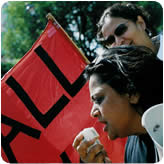Donors should fund UK campaigning charities to create an impact
Resource type: News
Foundations can make a lasting impact by funding United Kingdom charities to carry out social campaigns, such as lobbying, letter writing and protesting, according to this report by New Philanthropy Capital.
 London, UK – New Philanthropy Capital (NPC), the charity think tank, has today published Critical masses, a report encouraging donors to fund social campaigning by charities.
London, UK – New Philanthropy Capital (NPC), the charity think tank, has today published Critical masses, a report encouraging donors to fund social campaigning by charities.
The report argues that well-planned campaigns that measure their results offer a great opportunity for fundamental and long-lasting impact. Campaigning has led to some of the greatest social and political improvements in modern history, including the abolition of slavery, the banning of landmines, votes for women, and debt cancellation for the poorest countries.
Critical masses states that this crucial but often poorly-funded area of work allows charities to tackle the root causes of social problems. In some circumstances, campaigning is the only effective course of action available. The guide also addresses common concerns expressed by donors, explaining that social campaigning is legal, effective and can produce tangible results.
According to Gustaf Lofgren, a Research Analyst at NPC and co-author of the report, “Good campaigns have clear goals, an explicit idea of how to reach them, and tools for measuring what they achieve.”
Social campaigning incorporates a wide range of activities – including lobbying, letter writing, public demonstrations, protests, and advertising campaigns – that can all make a difference. In the report, NPC gives examples of a number of successful charities and campaigns, including the Every Disabled Child Matters (EDCM).
Launched in 2006 and funded by the True Colours Trust, the EDCM campaign aims to strengthen and extend the rights of disabled children and their families. The campaign has helped bring about a specific review of disabled children’s services, a new national indicator on disabled children’s services to measure performance in every local authority, and the allocation of £430m in new funding to improve services. The True Colours Trust funded the campaign through a three-year grant of £500k, which means that every pound spent helped to raise £850 of public funding.
EDCM Board member Brian Lamb, Chair of the Special Educational Consortium, says, “We are delighted to feature as a case study in the report and we congratulate NPC for evidencing the impact that campaigning can have. EDCM has shown that with relatively small investment, effective campaigning can produce massive returns which would far exceed those from direct service delivery. We hope all funders will take notice of this compelling report and start to shift their funding priorities towards campaigning.”
A number of other charities recommended by NPC are highlighted in the report for their campaigning work, including Cancer Research UK (CancerCampaigns), London Citizens (the London Living Wage Campaign), Autism Cymru, Children’s Rights Alliance for England, Thames Reach and Asylum Aid.
For further information about NPC, its research reports and charity recommendations, visit www.philanthropycapital.org.
New Philanthropy Capital (NPC) is a charity that maximises the impact of donors and charities—it does this through independent research, tools for charities and advice for donors. Its research guides donors on how best to support causes such as cancer, education and mental health. As well as highlighting the areas of greatest need, NPC identifies charities that could use donations to best effect. Using this research, it advises clients and their trusted advisors.
NPC develops a detailed understanding of social problems by talking to policy-makers, practitioners, academics and other experts. Its charity recommendations are arrived at after visiting and analysing charities across the sector, looking at five key criteria: the charity’s activities, results, sector impact, leadership and finances.
The report Critical masses is the product of over a year of detailed desk research and consultations with more than 70 experts from charities, trusts and foundations and support organisations. As it looks at a type of charitable activity rather than a sector, it also draws on NPC’s accumulated experience from more than 30 reports on a range of sectors and issues – from homelessness to domestic violence.
Donors and funders who want to find out more about campaigning work can turn to individual sector reports. NPC’s charity recommendations in a range of sectors and the full report Critical Masses are available for download from our website www.philanthropycapital.org.
The terms social campaigning and advocacy are used synonymously in the report. Social campaigning and advocacy are defined as: an influencing effort that aims to affect specific policies, attitudes or actions in order to improve conditions for some group of beneficiaries. This includes campaigning, lobbying, awareness raising/public education, research and campaigning capacity-building.
Beneficiaries do not necessarily have to be a well-defined group: some charities work on behalf of specific minorities, while others, including environmental charities, may intend for their work to benefit the whole world.
The Every Disabled Child Matters (EDCM) is a campaign to strengthen and extend the rights of disabled children and their families. It was launched in 2006, and echoing the government’s ‘Every Child Matters’ slogan, highlights the fact that the government’s agenda for children has not yet delivered for disabled children and their families, who continue to fall through the gaps between agencies and services. EDCM is and led by four organisations working with disabled children and their families – Contact a Family, Council for Disabled Children, Mencap and the Special Educational Consortium – and funded by the True Colours Trust. Focusing on Whitehall, Westminster and English local government, EDCM also supports campaigning on disabled children in the rest of the UK.
Other charities recommended by NPC and highlighted in the Critical masses report for their campaigning work include: Cancer Research UK (CancerCampaigns), London Citizens (the London Living Wage Campaign), Autism Cymru, Children’s Rights Alliance for England, Thames Reach and Asylum Aid.
Critical masses was funded by: Comic Relief, The Diana, Princess of Wales Memorial Fund and The Esmée Fairbairn Foundation.